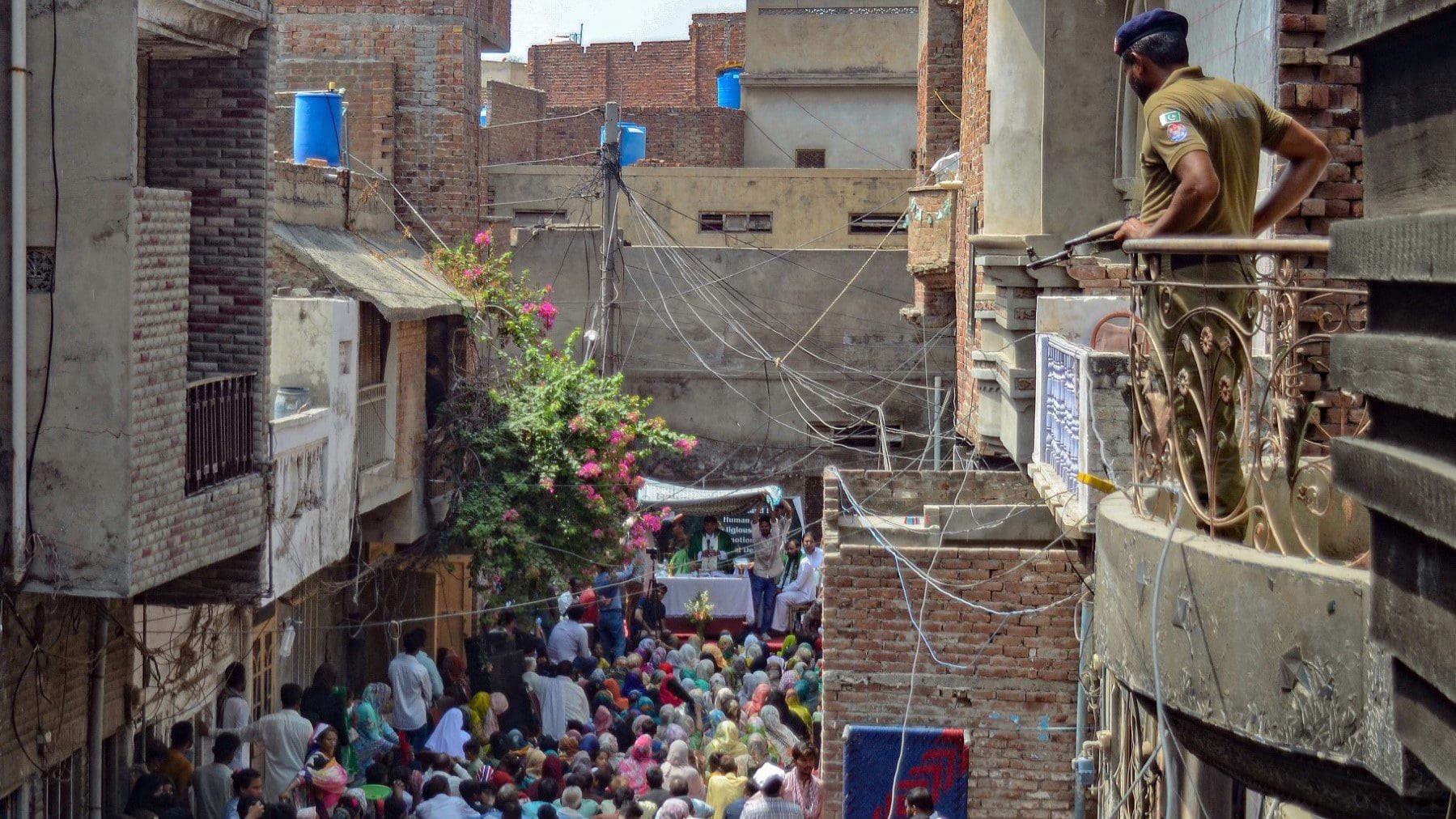In recent months, the persecution of Christians in Pakistan has intensified. The latest episodes of violence started on 16 August 2023, when hundreds of Muslim men attacked Jaranwala, a Christian settlement in the Faisalabad district, Punjab province after two community members were accused of ‘blasphemy’. Armed with stones and sticks, the mob vandalized several churches, dozens of houses, and a cemetery.
The attack was incited by a group of religious extremists who accused a local Christian family of defiling the Qur’an. A Christian leader, Akmal Bhatti, told Reuters that the crowd had torched at least five churches and looted valuables from houses their owners had abandoned after clerics made announcements in mosques inciting the mob. Videos posted on social media showed local Muslim leaders using mosque loudspeakers to urge their followers to demonstrate. In the video, one cleric says: ‘Christians have desecrated the Holy Qur’an. All the clerics, all the Muslims, should unite and gather in front of the mosque. Better to die if you don’t care about Islam.’ According to reports, the police have arrested 130 people alleged to be involved in the attacks. However, residents have told rights activists that the police warned them about an incoming mob hours before the attack, but claimed that they could not prevent it from happening.
The Jaranwala incident has impacted more than 1,000 Christian families in the affected neighbourhood. The destruction of their homes and businesses left them homeless and financially devastated. As the Persecution.org article states, the Jaranwala incident also shocked the broader Christian community in Pakistan and served as a wake-up call to the public regarding the vulnerability and marginalization experienced by religious minorities in the country.
Pakistani Christians are Discriminated in Every Aspect of Public and Private Life
According to the 2023 World Watch List compiled by Open Doors, Pakistan is the seventh most dangerous country for Christians in the world. There are around 4.2 million Christians in Pakistan—only 1.8 per cent of the country’s population of more than 229 million people.
As the Open Doors’ report on Pakistan explained in 1947, when the country officially became an independent Muslim state, the situation of the Christian minority became more complicated.
The report states that Pakistani Christians are considered second-class citizens and are discriminated against in every public and private life aspect. Although historical churches have relative freedom to worship and engage in other activities, they are heavily monitored and regularly targeted for bomb attacks.
All Pakistani Christians suffer from institutionalized discrimination,
with jobs seen as low, dirty and denigrating reserved for Christians by the authorities, as can be seen, for example, in job announcements. On the other hand, there are also Christians belonging to the middle class, but this does not save them from being marginalized or persecuted. According to reports, Christian women and girls are particularly vulnerable in Pakistan. There is a silent epidemic of kidnappings, forced marriages and forced conversion of Christian girls and women in Pakistan. These ‘marriages’ mean that a girl’s parents don’t have legal recourse to rescue their (often underage) daughter—and it is a widely-used tactic to persecute minority faith communities, such as Christians.
Pakistan’s Blasphemy Law: The Second Strictest in the World After Iran
Blasphemy laws have existed in Pakistan since the 1800s, but there has been a steady rise in their formal use within society. Section 295-C of Pakistan’s penal code, known as the blasphemy law, carries a mandatory death sentence, making it the second-strictest blasphemy law in the world after Iran. The laws penalize Christians for any action considered offensive to Islam, which leads to false accusations for the slightest grievances or personal revenge. Instead of erasing or loosening the law at the beginning of 2023, the parliament strengthened it, which means it not only means death for those deemed to have insulted Islam or the Prophet Muhammad,
but now it can also be used to punish anyone who allegedly insulted anyone connected to the Prophet in any way.
Those convicted of insulting the Prophet Muhammad’s wives, companions or close relatives from the beginning of 2023 face ten years in prison, a sentence that can be extended to life, and a fine of one million rupees, which is roughly $4,500. It also makes the charge of blasphemy an offence for which bail is impossible. As Saroop Ijaz, the senior counsel for Human Rights Watch in Asia, pointed out, ‘Pakistan’s existing blasphemy laws have enabled and encouraged legal discrimination and persecution in the name of religion for decades.’
Since 1990, at least 65 people have reportedly been killed in Pakistan over claims of blasphemy. According to the Open Doors’ World Watch List, the number of blasphemy cases is increasing, as is the number of Christian (and other minority religions) girls being abducted, abused, and forcefully converted to Islam. A draft bill on forced conversion was rejected by parliament after religious scholars had deemed it as ‘anti-Islamic’.
Past Tragedies: Hundreds of Christians Killed Because of False Allegations of Blasphemy
As the aforementioned Persecution.org article pointed out, this September marks the tenth anniversary of one of Pakistan’s worst attacks against Christians when 127 worshippers were killed in the All Saints Church bombing. On 22 September 2013, two explosions erupted in the courtyard of All Saints Church in Peshawar, Pakistan. The explosions ripped through the crowd of hundreds of Christians coming out of the church following a Sunday service. The resulting scene was mass carnage, with shrapnel, body parts and blood littering the church courtyard. When the smoke cleared, according to reports, there were bodies of over 100 Christians killed, and hundreds were more wounded, requiring immediate medical attention. The Jundallah group, an affiliate of the Pakistani Taliban, claimed responsibility for the deadly suicide bombing. To this date, it remains one of the deadliest attacks on Pakistan’s Christian community.
Another attack that deeply marked the Christian community in Pakistan happened on 6 February 1997 in Shanti Nagar when thousands of Muslim fundamentalists attacked the small village of Punjab. The Muslim mob destroyed 13 churches and about 775 Christian houses, burned some 2,000 Bibles, and over 2,500 Christians were also forced to flee. The attack came after allegations from Muslims that Christians are the ‘spies of the West’ and blasphemers.
As UCAnews noted, the Jaranwala attack was similar to the Shanti Nagar one, as both were based on unproved false allegations of Islamic fundamentalists and were both premeditated and well-coordinated. The article’s writer, Anee Muskan, visited Jaranwala one day after the attack and described the experience as ‘walking through a living hell.’ Muskan wrote the following about the aftermath of the attack: ‘Burned Bible pages were scattered all over. The stench of the chemicals and molten metals was strong enough to give a sense of burning in the nostrils and throat.’ He added, ‘A pastor’s house linked with the church gave a sense of destruction. The floor was covered with the ashes of what might have been furniture at a time, school bags were reduced to ashes, and quilts lay shredded. The same scenes of destruction were witnessed in several other houses. People who lost everything were crying as they returned to the debris of their shelters, where they had been living for years.’ Muskan declared that
the international community should take some serious steps to end the plight of Pakistan’s poor and persecuted Christians.
Tristan Azbej: ‘We Assure the Attacked Pakistani Christian Community of Our Sincere Solidarity’
Tristan Azbej, the Hungarian state secretary in charge of aiding persecuted Christians, reacted the following after the Jaranwala attacks in a Facebook post, stating: ‘We condemn the acts of violence for which no justification or legitimate reason can be given. We welcome the strong condemnation of the Jaranwala attacks by the Acting Prime Minister of Pakistan and his promise to bring the perpetrators to justice. We trust that the Pakistani state, an important partner of our country in the region, will do everything to ensure that the Christian community lives in peace and security.’
The state secretary also noted that in connection with the Qur’an burnings committed in some European countries, Hungary condemns incitement against religious, ethnic or national communities. ‘We are firmly committed to promoting dialogue between religions and cultures and respecting religious communities. We assure the attacked Pakistani Christian community of our sincere solidarity,’ he added. To conclude, the state secretary reminded that Hungary supports Christians and other communities in need through the Hungary Helps programme.








